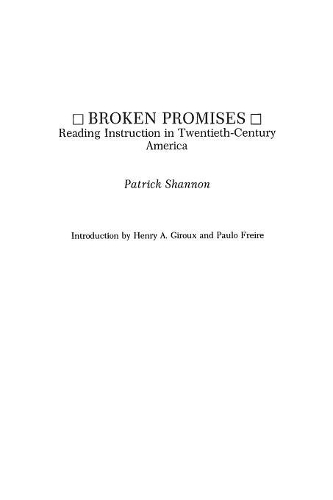
Broken Promises: Reading Instruction in Twentieth-Century America
(Paperback)
Publishing Details
Broken Promises: Reading Instruction in Twentieth-Century America
By (Author) Patrick Shannon
Bloomsbury Publishing PLC
Praeger Publishers Inc
30th October 1988
United States
Classifications
Tertiary Education
Non Fiction
Politics and government
Literacy (Theories of reading and writing)
320.973
Physical Properties
Paperback
208
Width 152mm, Height 229mm
284g
Description
The book has more fire--more `call to arms' gusto--than anything I've read on reading education. Richard Abrahamson, University of Houston Broken Promises is an important and powerful book precisely because it provides the opportunity for us all to experience the kinds of insights and construct the kinds of understandings that we need to grow professionally and to be a profession. Reading Research & Instruction Journal The volume provides a cogent critique of majority practice. This is one of the few volumes that relate `critical pedagogy,' as exemplified by the work of Giroux, Apple, and others, to specific examples of school practice. Because reading instruction is a central school activity, this connection is significant and the content is of value to anyone interested in public education. Choice Shannon argues that a combination of psychology, science, and capitalism has transformed reading from a means of personal and social empowerment into an ability to perform well on tests and has transformed learning from a human transaction between teacher and student into an exchange between things--commercially packaged reading materials--and students. To rationalize reading instruction according to these principles, he says, is to silence the voices of readers and teachers. These compelling new ideas, carefully grounded in research, show how popular solutions to problems in reading instruction--mastery learning, merit pay, and school effectiveness research--actually work against improving teachers' instructional behavior and children's learning ability. A rallying call for teachers of reading, a tool for change, and a most provocative text for students of reading at all levels.
Reviews
Broken Promises is an important and powerful book precisely because it provides the opportunity for us all to experience the kinds of insights and construct the kinds of understandings that we need to grow professionally and to be a profession.-Reading Research & Instruction Journal
Shannon, a critical researcher, ' sees his task as normative, to become an advocate in the political struggle over rules, definitions and meaning in every day life.' He argues that the introduction of basal readers and their attendant workbooks and teacher training packages has mechanized reading instruction and diverted teachers from teaching to being managers of classrooms. The heart of the book is a summary of four interview studies in school systems that illustrate the bureaucratization of reading instruction and the school personnel's belief in the scientific validity of skill-centered reading programs. Shannon also discusses the infamous mastery learning program in Chicago, which raised test scores but left children unable to read. The book includes a historical section, which argues that the majority of reading instruction in the US has been consistently mechanical.' The volume ends with some examples of Reaction and Resistance to Managed Reading Programs.' The recent increased popularity of whole-language approaches is only briefly mentioned but the pedagogic and political implications of systematic, scientific, ' reading instruction are clearly delineated. The volume provides a cogent critique of majority practice. This is one of the few volumes that relate critical pedagogy, ' as exemplified by the work of Giroux, Apple, and others, to specific examples of school practice. Because reading instruction is a central school activity, this connection is significant and the content is of value to anyone interested in public education. The style is accessible; there is an extensive bibliography and an index.-Choice
"Broken Promises is an important and powerful book precisely because it provides the opportunity for us all to experience the kinds of insights and construct the kinds of understandings that we need to grow professionally and to be a profession."-Reading Research & Instruction Journal
"Shannon, a critical researcher, ' sees his task as normative, to become an advocate in the political struggle over rules, definitions and meaning in every day life.' He argues that the introduction of basal readers and their attendant workbooks and teacher training packages has mechanized reading instruction and diverted teachers from teaching to being managers of classrooms. The heart of the book is a summary of four interview studies in school systems that illustrate the bureaucratization of reading instruction and the school personnel's belief in the scientific validity of skill-centered reading programs. Shannon also discusses the infamous mastery learning program in Chicago, which raised test scores but left children unable to read. The book includes a historical section, which argues that the majority of reading instruction in the US has been consistently mechanical.' The volume ends with some examples of Reaction and Resistance to Managed Reading Programs.' The recent increased popularity of whole-language approaches is only briefly mentioned but the pedagogic and political implications of systematic, scientific, ' reading instruction are clearly delineated. The volume provides a cogent critique of majority practice. This is one of the few volumes that relate critical pedagogy, ' as exemplified by the work of Giroux, Apple, and others, to specific examples of school practice. Because reading instruction is a central school activity, this connection is significant and the content is of value to anyone interested in public education. The style is accessible; there is an extensive bibliography and an index."-Choice
Author Bio
PATRICK SHANNON, currently Professor of Education at University of Minnesota, Duluth, has taught and worked with teachers in New York, Minnesota, Texas, Indiana and Canada and is co-author of The Report Card on Basal Readers (1987).
